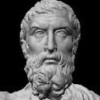And is it possible, Cleanthes, said Philo, that after all these reflections, and infinitely more, which might be suggested, you can still persevere in your Anthropomorphism, and assert the moral attributes of the Deity, his justice, benevolence, mercy, and rectitude, to be of the same nature with these virtues in human creatures? His power we allow is infinite: whatever he wills is executed: but neither man nor any other animal is happy: therefore he does not will their happiness. His wisdom is infinite: he is never mistaken in choosing the means to any end: but the course of Nature tends not to human or animal felicity: therefore it is not established for that purpose. Through the whole compass of human knowledge, there are no inferences more certain and infallible than these. In what respect, then, do his benevolence and mercy resemble the benevolence and mercy of men?
Epicurus (341-270 BC) Greek philosopher
(Attributed)
In David Hume (1711-1776), Dialogues Concerning Natural Religion, Part X (1779). Full text. Not found in the surviving writings of Epicurus.
This immediately precedes Epicurus' Old Riddle.

